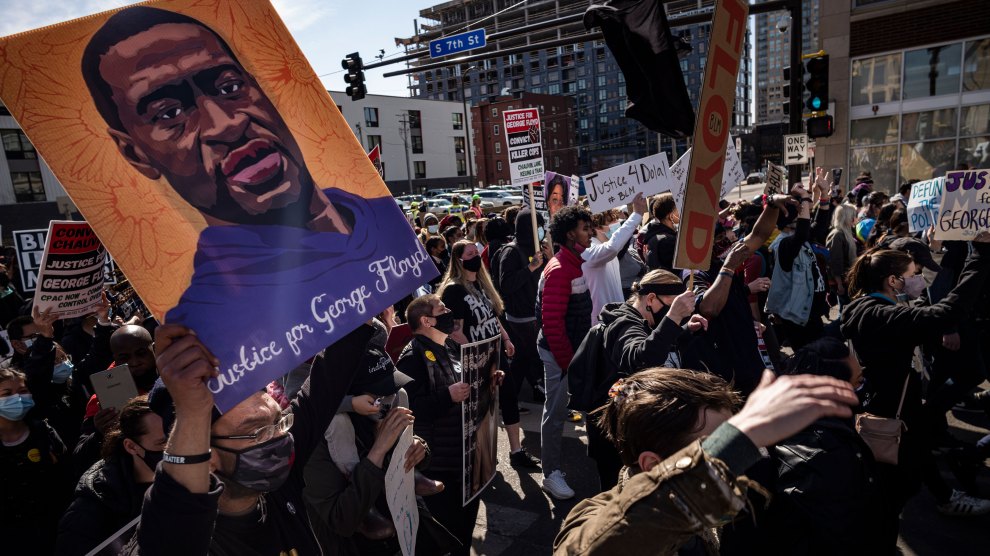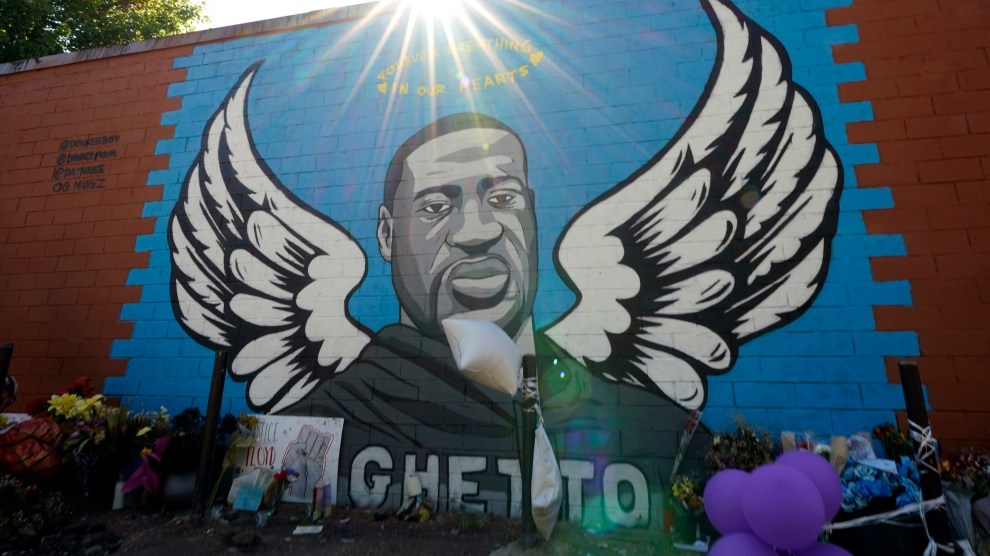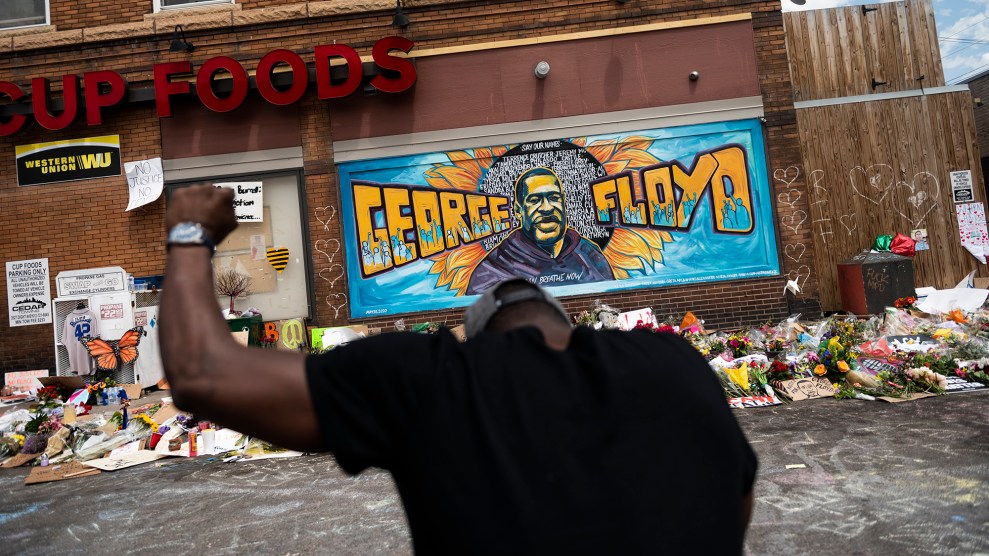
Richard Tsong-Taatarii/AP
Derek Chauvin, the former officer who was fired from the Minneapolis Police Department after he kneeled on George Floyd’s neck last May, faces a criminal trial that’s scheduled to begin this month. The city of Minneapolis won’t be paying his legal fees: Cops accused of crimes are typically on the hook for their attorney costs and other related expenses.
But that’s not a problem for Chauvin. He turned to the Minnesota Police and Peace Officers Association, a statewide group with hundreds of thousands of dollars set aside in a legal defense fund to pay for cops’ legal costs. It’s available to more than 10,000 law enforcement officers around Minnesota, including the three other ex-officers involved in Floyd’s death.
Police officers around the country can tap into similarly immense war chests to cover hefty expenses if they’re prosecuted for killing or injuring someone—resources that critics say give them an unfair advantage and make it easier for them to avoid guilty verdicts. Officers typically receive the benefit as part of their membership in police unions. They pay monthly or annual fees and then have access to this club of sorts and its financial resources. If they kill someone on the job, they call up the association and get connected with defense attorneys who can give them advice and guide them through the courts if they’re prosecuted.
“It’s part of a broader system that shields officers who commit misconduct from accountability,” says Samuel Sinyangwe, a data scientist who studies police unions for the nonprofit project Campaign Zero.
“These funds and the unions continue to push the narrative that law enforcement are the victims, not the perpetrators, no matter how much objective evidence you have,” says Ben Crump, an attorney who represents Floyd’s family and has worked on other high-profile cases alleging police brutality.
Minnesota’s police Legal Defense Fund is one of many such funds around the country. The biggest and oldest, under the Peace Officers Research Association of California, has tens of millions of dollars at its disposal that it offers to cops nationwide. More than 135,000 law enforcement officers in all 50 states are members of its Legal Defense Fund, which holds a whopping $39 million in reserves, up from $18 million in 2015, mostly accumulated from membership fees. And there’s no cap on how much the association will pay in court—it has spent $170 million defending law enforcement officers since 2007.
“Whether the case costs $100,000 or $1,000,000 to defend, we keep our long-standing promise of never skimping when our members’ lives and careers are on the line,” the association’s president, Brian Marvel, a police officer in San Diego, wrote in March. (As of December, the fund was assisting officers in 129 active criminal cases, many of them for on-duty shootings.)
Another national fund, the Law Enforcement Legal Defense Fund, operates like a charity, which means officers don’t need to be part of a union or pay fees to benefit from its financial assistance, which totaled $319,654 for legal cases in 2019. Several cops involved in high-profile killings have sought help from the LELDF, including the Baltimore officers who were acquitted after the 2015 death of Freddie Gray; the former Atlanta officer who killed Rayshard Brooks outside a Wendy’s last summer, whose attorney has asked a court to dismiss the criminal case against him; the former Forth Worth officer who fatally shot Atatiana Jefferson in 2019 while she was at home with her eight-year-old nephew, whose trial is tentatively set for later this year; and the former officer in Maryland who received a pardon from Donald Trump in December after spending a decade in prison for a brutality case related to her K-9.
Attorney costs can quickly rack up because some of these court cases drag on for years: With financial resources from LELDF, Joseph Weekley, the officer who fatally shot seven-year-old Aiyana Stanley-Jones while she slept on a couch in Detroit in 2010, survived two hung juries before a prosecutor ultimately dismissed the charges against him five years later.
Civilians in other types of jobs, even if they’re part of unions, might have access to arbitration if they’re fired, but their labor associations typically won’t cover their court expenses if they’re accused of a crime. Some police officers say it makes sense for their unions to build up legal defense funds, even though other types of unions don’t, because their profession requires them to enter situations where they may need to use force, putting them at greater risk of being sued or prosecuted. The goal, says Jason Johnson, a former deputy police commissioner in Baltimore who is now president of the LELDF, is to ensure everyone is afforded due process. “All we’re trying to do is to prevent law enforcement officers from having to choose between being able to feed their family and children and being able to be adequately represented in court,” he says. “It doesn’t change the calculus on holding officers accountable.”
Yet it’s extremely rare for cops to be convicted of crimes after shooting or killing someone—in part because of lenient use-of-force laws, and in part because prosecutors and grand juries rarely indict them. Activists argue the legal defense funds tip the scale further in their favor. As Timothy Belcher, a labor attorney in Vermont, puts it: “It adds another layer to the story of how these cops are basically untouchable legally.”
This arrangement can be problematic for another reason: Some of the associations running the legal defense funds also donate heavily to district attorney candidates who are then tasked with deciding whether to bring charges against officers. “There’s a conflict of interest if prosecutors take money from police unions and then face off against police-union-funded [defense] advocates in court,” says Maxwell Szabo, an attorney who formerly worked as a spokesperson in the San Francisco DA’s office.
The Peace Officers Research Association of California (PORAC), which manages the country’s biggest, multimillion-dollar defense fund for police, regularly spends money supporting prosecutor candidates in their elections across California. In 2013, it gave at least $3,000 to Sacramento DA Anne Marie Schubert, who six years later decided not to press charges against the officers who shot Stephon Clark while he was standing in his grandparents’ backyard with a cellphone in his hand. Given that PORAC is based in Sacramento and has a board member who works for Sacramento’s Police Officers Association, it’s possible the group also helped the officers pay for their defense attorneys. PORAC declined an interview request from Mother Jones.
Johnson, the former Baltimore deputy police commissioner who leads the charitable LELDF, which does not support political candidates, says police unions are entitled to get involved with political campaigns that will affect their members’ professions. Other unions do that, too. “I don’t see a conflict of interest,” he says.
More recently, PORAC gave at least $724,000 to try to defeat reformist Los Angeles DA George Gascón, who campaigned last year on a platform of holding cops accountable in a county that sees more law enforcement shootings than almost anywhere else in the country. “Gascón and his ilk look at you as criminals and not the guardians you are,” Marvel wrote to his police colleagues in a January newsletter, adding that he hoped the newly elected prosecutor would be recalled. Though Marvel’s association lost that race, it has succeeded enormously at lobbying against police reforms at the California statehouse, working alongside other law enforcement unions and associations. “We need to make ‘defund the police’ a toxic phrase for elected officials,” Marvel added in the newsletter.
His organization has the money to do it. California police unions and associations spent $2 million for lobbyists to influence state legislation in 2017—nine times more than the NRA spent on lobbyists that year, according to an analysis by Sinyangwe’s Campaign Zero. And of that, PORAC contributed nearly a quarter. It spent another $1.6 million on political campaign donations from 2011 to 2017. “They are the single largest and most influential group within the police association orbit,” says Sinyangwe. He adds that PORAC and police unions often donate heavily to state lawmakers who they hope will oppose or water down police-reform laws, including ones dealing with use of force.
At the federal level, Marvel testified in front of the nonpartisan commission established by Trump in 2019 to study ways of improving policing in America. (The commission was later found to have violated the law because it was composed solely of law enforcement representatives and no civil rights activists, academics, or defense attorneys.) “[T]he issue of police reform is sure to remain salient under the Biden administration. As those conversations continue, PORAC will be there, ensuring that the voices of California law enforcement officers are at the table,” legal analysts wrote in the association’s January 2021 newsletter. They added that the association opposes the George Floyd Justice in Policing Act, which Democrats in Congress are pushing as a way to reduce police violence.
While members of PORAC and other police legal defense organizations are forthright about their disdain for the defund-police movement inspired by Floyd’s death, most have condemned his killing. “Officer Chauvin, he betrayed the badge,” Brian Peters, executive director of the Minnesota Police and Peace Officers Association, which is paying for Chauvin’s defense, told CBS’s Gayle King in a recent interview. (His association declined to speak with Mother Jones.)
“A vast majority of peace officers around the nation, including PORAC, were shocked and saddened by what we saw on that video,” Marvel wrote in July 2020, referring to the video footage of Chauvin kneeling on Floyd’s neck. PORAC’s vice president wrote last summer that it was a “gross exaggeration” to suggest “there is an epidemic of police brutality,” but that “it goes without saying that we as law enforcement officers condemn what occurred.”
But that doesn’t detract from their desire to provide a proper defense for the four officers now facing prosecution for Floyd’s death. “Every citizen has a right to due process, and it just has to play out,” Peters told King. When asked what would be a fair outcome in Chauvin’s case, he added, “Is there a fair outcome? I don’t think there is.”
Chauvin faces charges of second-degree murder, third-degree murder, and manslaughter. His attorney, Eric Nelson, is expected to argue that Floyd died because of underlying health problems and drug use, though an autopsy report concluded Floyd died in a homicide; his heart failed after Chauvin restrained him on the ground. Last Friday, the city of Minneapolis announced it would pay Floyd’s family $27 million after the family filed a civil lawsuit—one of the largest pretrial settlements in US history for an alleged wrongful death at the hands of police.
On Monday, Chauvin’s attorney asked the judge overseeing the criminal case to delay the trial, because he argued the settlement could bias jury members. The judge began recalling previously selected jurors to question them about it. It’s unclear how many weeks or months the jury selection and other court hearings will drag on. But one thing is certain: However long the trial lasts, Chauvin will likely be able to afford it.
















